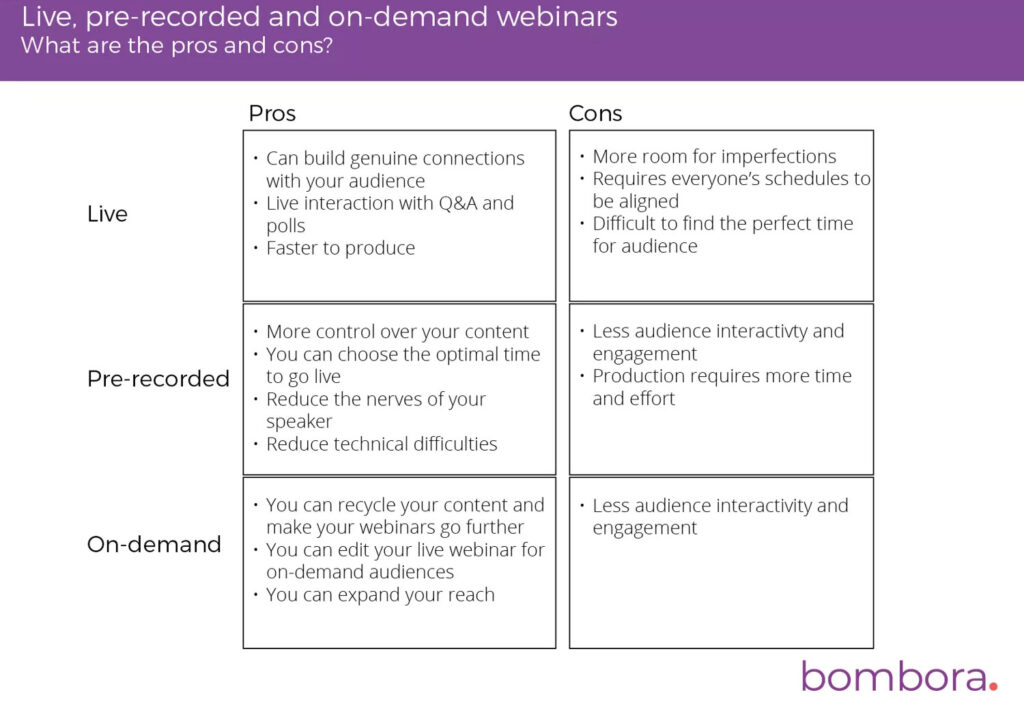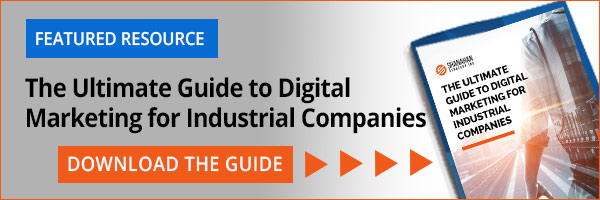When a global pandemic caused companies to cancel in-person events, businesses that relied on face-to-face meetings had to pivot. Luckily, webinars for manufacturers are a highly beneficial and effective sales and marketing tool.
COVID-19 caused more than 83 million people to reschedule their event plans. Manufacturing businesses, whose complex, technical products and processes are often better explained in person, had to find alternative ways to connect with their audience. Since then, webinars have become a popular option. The webinar market will hit $800 million by 2023. As marketers realize the value of webinars as a sales and marketing tool, webinars for manufacturers are becoming an important aspect of marketing trends for manufacturing companies.
Keep reading to learn how manufacturers can capitalize on webinars for sales increase and revenue generation.
Key Takeaways
- Webinars are internet-based video conferences that enable people in different locations to gather face-to-face.
- Companies use webinars for various purposes, including educating an audience, demonstrating a product, and building deeper connections with prospects.
- From content marketing for manufacturing companies to building trust and credibility among target markets, there are five significant ways webinars can serve as a sales and marketing tool for manufacturers.
What Exactly Are Webinars?
Webinars (web seminars) are internet-based video conferences that allow people in different locations to meet face-to-face. In real-time, people can have interactive conversations and give presentations and demonstrations without being in the same room. Typically, a webinar is live (although it could be pre-recorded or on-demand), is hosted by an individual, and (depending on the platform and software) can have one person or hundreds in attendance.
The host can share their screen with the group so that everyone can see the visual aids (like stream video or display slides) in the presentation. They can also record the entire meeting, which they can reference later for sales and marketing feedback, share with the attendees later so they can review the content, or post it on their website for people unable to attend. Webinars also offer a chat feature, allowing attendees to share comments and questions during the meeting for increased engagement.
How Do Companies Use Webinars?
Businesses use webinars to accomplish several goals, including:
- Educate an audience: A lecture approach gives industry experts a platform to teach others about manufacturing trends.
- Promote a business: Webinars help an audience get to know your brand identity and learn more about your mission and values.
- Demonstrate a product or process: Live video demonstrations enable manufacturers to point out the features and functionality of a particular product, which in this industry can often be difficult to understand from a simple product description on a web page.
- Build stronger connections: When people visit face-to-face, there’s a human element to the meeting, and people can connect on a deeper level.
- Driving website traffic for manufacturing companies: When people gain value from your webinar, they’ll feel compelled to visit your website to see what other useful content (and solutions) you provide.
The greatest advantage of a webinar is that it removes the geographical barrier that can limit meeting attendance. There are no travel expenses, so people from all over the world can afford to get together. There’s no commute time to consider, so people don’t have to take more time off work to attend a conference.
As long as they have an internet connection, people can access the meeting from anywhere. Attendees don’t have to be on camera, so someone can participate in a webinar while sitting at their kid’s soccer game. Webinars make meetings affordable, convenient, and accessible.
Webinars for Manufacturers as a Sales and Marketing Tool
Face-to-face communication is important when it comes to sales and marketing for manufacturers. Explaining a complicated technological process or demonstrating a highly technical machinery part can mean the difference between closing a sale and losing a customer. Webinars can be the next best thing when distance or budget doesn’t allow for in-person meetings.
The following video shares how manufacturing businesses can use webinars to boost their marketing efforts:
Source: Jotform on YouTube
Webinars are an effective sales and marketing tool. Here are five ways webinars for manufacturers help to drive sales, connect with customers, and boost ROI.
1. Content Marketing
Content is key for today’s consumers. They want to consume valuable information that helps solve their problems, and webinars do just that. Through online video conferences, buyers gain insight into your company and your products, making a more informed purchase decision. Good information is especially important to people looking to purchase an expensive piece of equipment.
Content is also one of the SEO basics for manufacturing and industrial companies. The more quality content you provide, the more search engines will reward you with higher SERPs and greater visibility.
2. Audience Reach
Because virtually anyone can attend an online conference, webinars grant you the opportunity to expand your reach. You’re unlimited by geographical borders and can grow an international customer base with little effort and low cost. Through buyer personas and audience research, you can identify your ideal customer and connect with them regardless of location.

3. Quality Lead Generation
Through face-to-face interactions, you’re able to not only connect with your audience on a deeper level but you’re able to learn more about their needs and preferences. You can gain the insight you need to create custom marketing materials that address buyers’ unique concerns through real-time conversations. Customized marketing helps generate quality leads looking for the solutions you provide and are thus more likely to convert to customers.
4. Capitalize on Quality Material
Once you’ve hosted a successful webinar, you can capitalize on that quality content in numerous ways. Use the information to create informative blog posts for your website. Pull some insightful quotes and post them on your social media platforms. Upload the video recording to your website to attract more traffic. Or offer it as a for-purchase download to people who couldn’t attend. These are website must-haves for manufacturing companies because webinars can continue to drive sales for you long after your conference has ended.
5. Increase Brand Awareness
Webinars are an effective aspect of brand marketing for manufacturing companies. Your company logo, corporate colors, and brand image are on the screen for the duration of the meeting. People get to know you as a company and as an individual representative and see first-hand what you’re all about. When you show viewers your authentic self, you build trust, earn credibility, and can position yourself as a thought leader in your industry. All of this helps to increase brand awareness and keeps you front of mind when they’re ready to purchase the solutions you provide.
Incorporate Webinars Into Your Sales and Marketing Strategy
Shanahan Strategy helps industrial and manufacturing companies create digital marketing and sales strategies that generate leads and grow revenue.
Contact Shanahan Strategy today to learn how we can help you incorporate effective webinars into your sales and marketing strategy for continued success.


